Report on Entrepreneurship: Ventures, Impact, and Economic Development
VerifiedAdded on 2023/03/31
|11
|3345
|149
Report
AI Summary
This report provides a comprehensive overview of entrepreneurship and small business management. It begins by defining entrepreneurship and its significance, emphasizing the role of innovation and risk-taking in establishing successful ventures. The report then delves into various types of entrepreneurial ventures, including survival, lifestyle, managed growth, and aggressive growth ventures, categorizing them based on size, motivation, and ownership. It differentiates between opportunity and necessity-driven entrepreneurship, as well as other forms like women, social, venture financing, corporate, global, and public sector entrepreneurship. A comparison of public and private enterprises, along with a differentiation between small, medium, and large ventures, is presented. The report further analyzes the impact of different venture sizes on economic development, highlighting the contributions of small, medium, and large enterprises to revenue generation and employment. It emphasizes the importance of small businesses in fostering social economic growth, discussing their contributions to employment, technological advancements, and community welfare, and their role in driving competition and innovation within the economy.

Entrepreneurship and
Small Business
Managements
Small Business
Managements
Paraphrase This Document
Need a fresh take? Get an instant paraphrase of this document with our AI Paraphraser

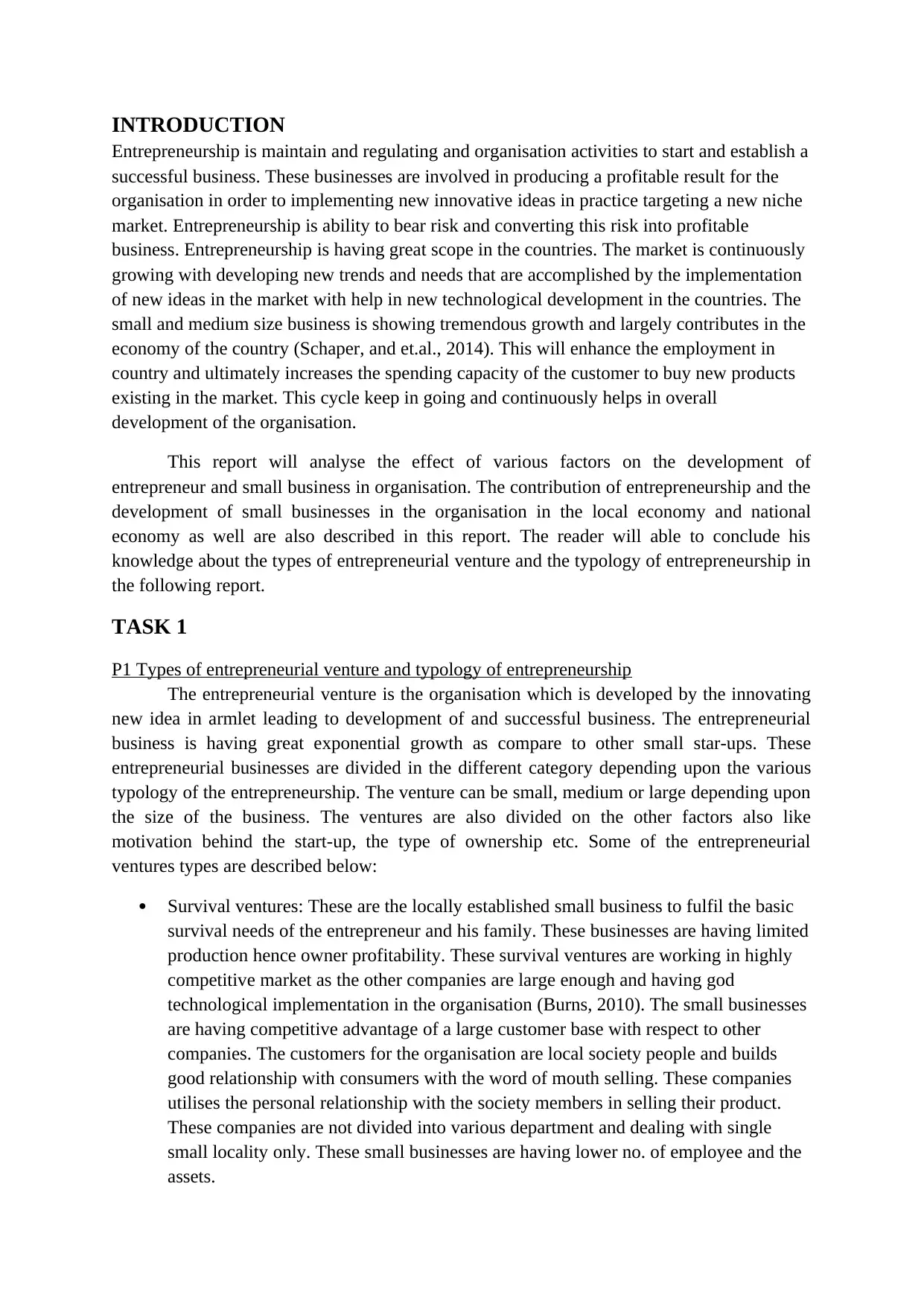
INTRODUCTION
Entrepreneurship is maintain and regulating and organisation activities to start and establish a
successful business. These businesses are involved in producing a profitable result for the
organisation in order to implementing new innovative ideas in practice targeting a new niche
market. Entrepreneurship is ability to bear risk and converting this risk into profitable
business. Entrepreneurship is having great scope in the countries. The market is continuously
growing with developing new trends and needs that are accomplished by the implementation
of new ideas in the market with help in new technological development in the countries. The
small and medium size business is showing tremendous growth and largely contributes in the
economy of the country (Schaper, and et.al., 2014). This will enhance the employment in
country and ultimately increases the spending capacity of the customer to buy new products
existing in the market. This cycle keep in going and continuously helps in overall
development of the organisation.
This report will analyse the effect of various factors on the development of
entrepreneur and small business in organisation. The contribution of entrepreneurship and the
development of small businesses in the organisation in the local economy and national
economy as well are also described in this report. The reader will able to conclude his
knowledge about the types of entrepreneurial venture and the typology of entrepreneurship in
the following report.
TASK 1
P1 Types of entrepreneurial venture and typology of entrepreneurship
The entrepreneurial venture is the organisation which is developed by the innovating
new idea in armlet leading to development of and successful business. The entrepreneurial
business is having great exponential growth as compare to other small star-ups. These
entrepreneurial businesses are divided in the different category depending upon the various
typology of the entrepreneurship. The venture can be small, medium or large depending upon
the size of the business. The ventures are also divided on the other factors also like
motivation behind the start-up, the type of ownership etc. Some of the entrepreneurial
ventures types are described below:
Survival ventures: These are the locally established small business to fulfil the basic
survival needs of the entrepreneur and his family. These businesses are having limited
production hence owner profitability. These survival ventures are working in highly
competitive market as the other companies are large enough and having god
technological implementation in the organisation (Burns, 2010). The small businesses
are having competitive advantage of a large customer base with respect to other
companies. The customers for the organisation are local society people and builds
good relationship with consumers with the word of mouth selling. These companies
utilises the personal relationship with the society members in selling their product.
These companies are not divided into various department and dealing with single
small locality only. These small businesses are having lower no. of employee and the
assets.
Entrepreneurship is maintain and regulating and organisation activities to start and establish a
successful business. These businesses are involved in producing a profitable result for the
organisation in order to implementing new innovative ideas in practice targeting a new niche
market. Entrepreneurship is ability to bear risk and converting this risk into profitable
business. Entrepreneurship is having great scope in the countries. The market is continuously
growing with developing new trends and needs that are accomplished by the implementation
of new ideas in the market with help in new technological development in the countries. The
small and medium size business is showing tremendous growth and largely contributes in the
economy of the country (Schaper, and et.al., 2014). This will enhance the employment in
country and ultimately increases the spending capacity of the customer to buy new products
existing in the market. This cycle keep in going and continuously helps in overall
development of the organisation.
This report will analyse the effect of various factors on the development of
entrepreneur and small business in organisation. The contribution of entrepreneurship and the
development of small businesses in the organisation in the local economy and national
economy as well are also described in this report. The reader will able to conclude his
knowledge about the types of entrepreneurial venture and the typology of entrepreneurship in
the following report.
TASK 1
P1 Types of entrepreneurial venture and typology of entrepreneurship
The entrepreneurial venture is the organisation which is developed by the innovating
new idea in armlet leading to development of and successful business. The entrepreneurial
business is having great exponential growth as compare to other small star-ups. These
entrepreneurial businesses are divided in the different category depending upon the various
typology of the entrepreneurship. The venture can be small, medium or large depending upon
the size of the business. The ventures are also divided on the other factors also like
motivation behind the start-up, the type of ownership etc. Some of the entrepreneurial
ventures types are described below:
Survival ventures: These are the locally established small business to fulfil the basic
survival needs of the entrepreneur and his family. These businesses are having limited
production hence owner profitability. These survival ventures are working in highly
competitive market as the other companies are large enough and having god
technological implementation in the organisation (Burns, 2010). The small businesses
are having competitive advantage of a large customer base with respect to other
companies. The customers for the organisation are local society people and builds
good relationship with consumers with the word of mouth selling. These companies
utilises the personal relationship with the society members in selling their product.
These companies are not divided into various department and dealing with single
small locality only. These small businesses are having lower no. of employee and the
assets.
⊘ This is a preview!⊘
Do you want full access?
Subscribe today to unlock all pages.

Trusted by 1+ million students worldwide
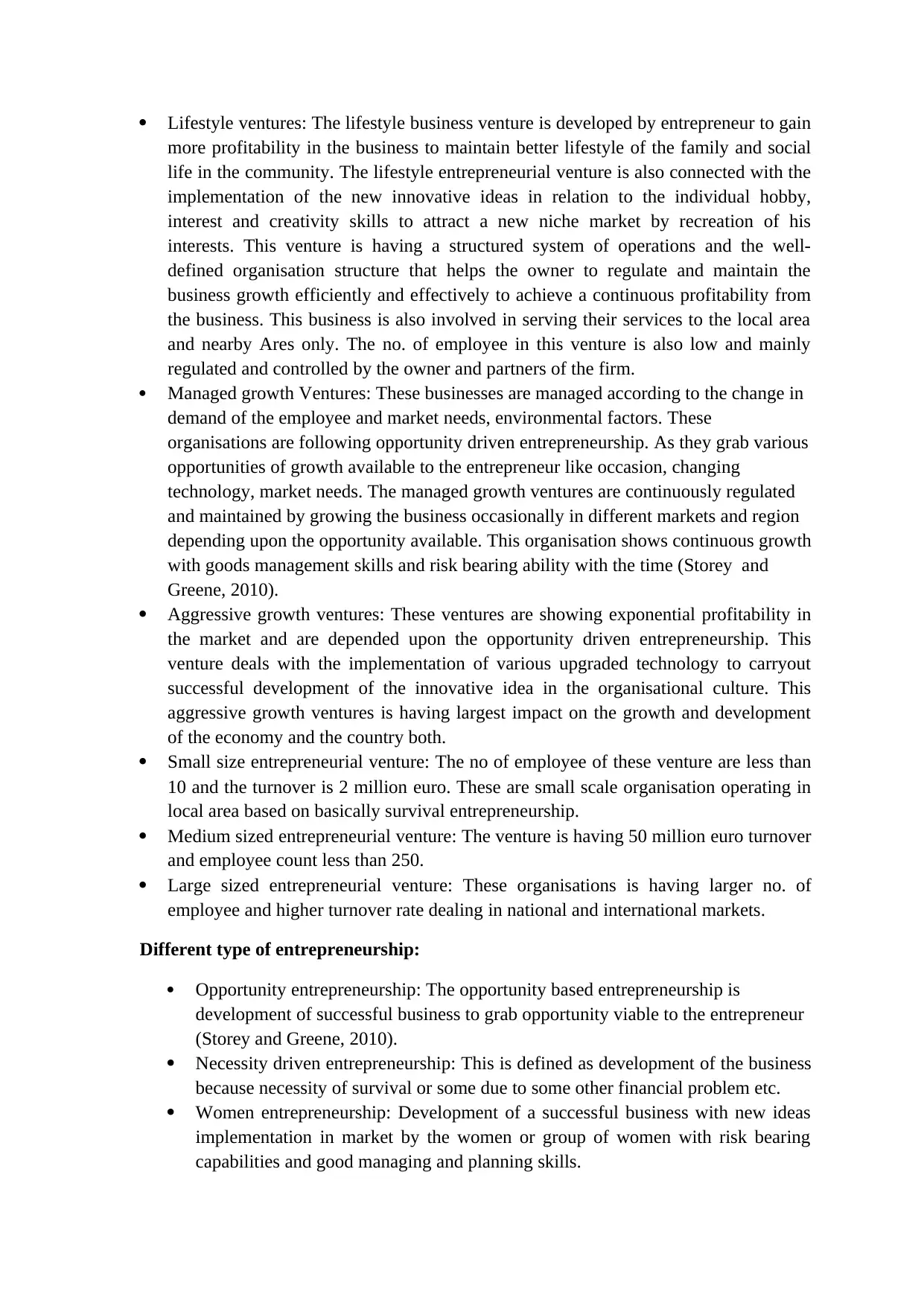
Lifestyle ventures: The lifestyle business venture is developed by entrepreneur to gain
more profitability in the business to maintain better lifestyle of the family and social
life in the community. The lifestyle entrepreneurial venture is also connected with the
implementation of the new innovative ideas in relation to the individual hobby,
interest and creativity skills to attract a new niche market by recreation of his
interests. This venture is having a structured system of operations and the well-
defined organisation structure that helps the owner to regulate and maintain the
business growth efficiently and effectively to achieve a continuous profitability from
the business. This business is also involved in serving their services to the local area
and nearby Ares only. The no. of employee in this venture is also low and mainly
regulated and controlled by the owner and partners of the firm.
Managed growth Ventures: These businesses are managed according to the change in
demand of the employee and market needs, environmental factors. These
organisations are following opportunity driven entrepreneurship. As they grab various
opportunities of growth available to the entrepreneur like occasion, changing
technology, market needs. The managed growth ventures are continuously regulated
and maintained by growing the business occasionally in different markets and region
depending upon the opportunity available. This organisation shows continuous growth
with goods management skills and risk bearing ability with the time (Storey and
Greene, 2010).
Aggressive growth ventures: These ventures are showing exponential profitability in
the market and are depended upon the opportunity driven entrepreneurship. This
venture deals with the implementation of various upgraded technology to carryout
successful development of the innovative idea in the organisational culture. This
aggressive growth ventures is having largest impact on the growth and development
of the economy and the country both.
Small size entrepreneurial venture: The no of employee of these venture are less than
10 and the turnover is 2 million euro. These are small scale organisation operating in
local area based on basically survival entrepreneurship.
Medium sized entrepreneurial venture: The venture is having 50 million euro turnover
and employee count less than 250.
Large sized entrepreneurial venture: These organisations is having larger no. of
employee and higher turnover rate dealing in national and international markets.
Different type of entrepreneurship:
Opportunity entrepreneurship: The opportunity based entrepreneurship is
development of successful business to grab opportunity viable to the entrepreneur
(Storey and Greene, 2010).
Necessity driven entrepreneurship: This is defined as development of the business
because necessity of survival or some due to some other financial problem etc.
Women entrepreneurship: Development of a successful business with new ideas
implementation in market by the women or group of women with risk bearing
capabilities and good managing and planning skills.
more profitability in the business to maintain better lifestyle of the family and social
life in the community. The lifestyle entrepreneurial venture is also connected with the
implementation of the new innovative ideas in relation to the individual hobby,
interest and creativity skills to attract a new niche market by recreation of his
interests. This venture is having a structured system of operations and the well-
defined organisation structure that helps the owner to regulate and maintain the
business growth efficiently and effectively to achieve a continuous profitability from
the business. This business is also involved in serving their services to the local area
and nearby Ares only. The no. of employee in this venture is also low and mainly
regulated and controlled by the owner and partners of the firm.
Managed growth Ventures: These businesses are managed according to the change in
demand of the employee and market needs, environmental factors. These
organisations are following opportunity driven entrepreneurship. As they grab various
opportunities of growth available to the entrepreneur like occasion, changing
technology, market needs. The managed growth ventures are continuously regulated
and maintained by growing the business occasionally in different markets and region
depending upon the opportunity available. This organisation shows continuous growth
with goods management skills and risk bearing ability with the time (Storey and
Greene, 2010).
Aggressive growth ventures: These ventures are showing exponential profitability in
the market and are depended upon the opportunity driven entrepreneurship. This
venture deals with the implementation of various upgraded technology to carryout
successful development of the innovative idea in the organisational culture. This
aggressive growth ventures is having largest impact on the growth and development
of the economy and the country both.
Small size entrepreneurial venture: The no of employee of these venture are less than
10 and the turnover is 2 million euro. These are small scale organisation operating in
local area based on basically survival entrepreneurship.
Medium sized entrepreneurial venture: The venture is having 50 million euro turnover
and employee count less than 250.
Large sized entrepreneurial venture: These organisations is having larger no. of
employee and higher turnover rate dealing in national and international markets.
Different type of entrepreneurship:
Opportunity entrepreneurship: The opportunity based entrepreneurship is
development of successful business to grab opportunity viable to the entrepreneur
(Storey and Greene, 2010).
Necessity driven entrepreneurship: This is defined as development of the business
because necessity of survival or some due to some other financial problem etc.
Women entrepreneurship: Development of a successful business with new ideas
implementation in market by the women or group of women with risk bearing
capabilities and good managing and planning skills.
Paraphrase This Document
Need a fresh take? Get an instant paraphrase of this document with our AI Paraphraser
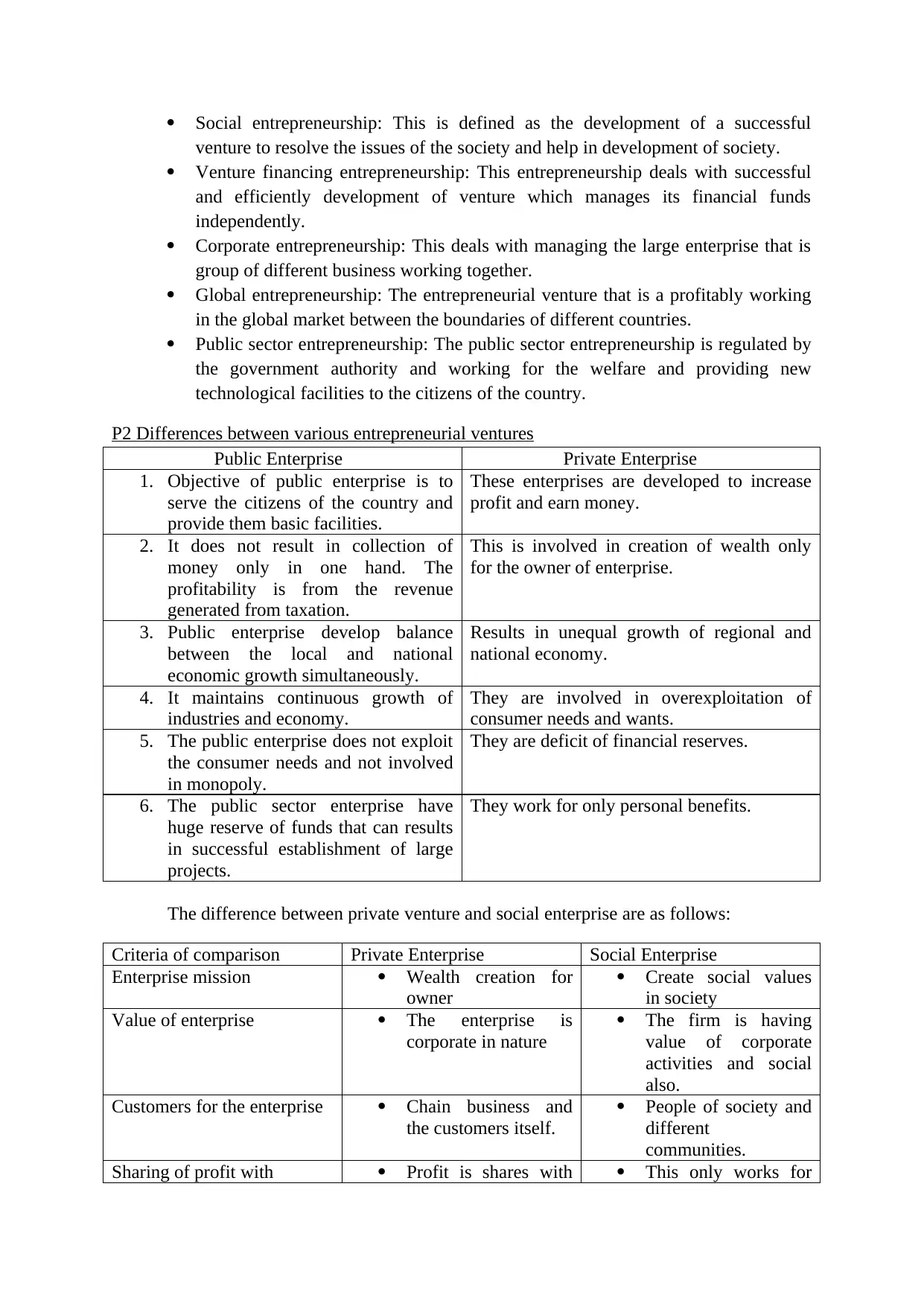
Social entrepreneurship: This is defined as the development of a successful
venture to resolve the issues of the society and help in development of society.
Venture financing entrepreneurship: This entrepreneurship deals with successful
and efficiently development of venture which manages its financial funds
independently.
Corporate entrepreneurship: This deals with managing the large enterprise that is
group of different business working together.
Global entrepreneurship: The entrepreneurial venture that is a profitably working
in the global market between the boundaries of different countries.
Public sector entrepreneurship: The public sector entrepreneurship is regulated by
the government authority and working for the welfare and providing new
technological facilities to the citizens of the country.
P2 Differences between various entrepreneurial ventures
Public Enterprise Private Enterprise
1. Objective of public enterprise is to
serve the citizens of the country and
provide them basic facilities.
These enterprises are developed to increase
profit and earn money.
2. It does not result in collection of
money only in one hand. The
profitability is from the revenue
generated from taxation.
This is involved in creation of wealth only
for the owner of enterprise.
3. Public enterprise develop balance
between the local and national
economic growth simultaneously.
Results in unequal growth of regional and
national economy.
4. It maintains continuous growth of
industries and economy.
They are involved in overexploitation of
consumer needs and wants.
5. The public enterprise does not exploit
the consumer needs and not involved
in monopoly.
They are deficit of financial reserves.
6. The public sector enterprise have
huge reserve of funds that can results
in successful establishment of large
projects.
They work for only personal benefits.
The difference between private venture and social enterprise are as follows:
Criteria of comparison Private Enterprise Social Enterprise
Enterprise mission Wealth creation for
owner
Create social values
in society
Value of enterprise The enterprise is
corporate in nature
The firm is having
value of corporate
activities and social
also.
Customers for the enterprise Chain business and
the customers itself.
People of society and
different
communities.
Sharing of profit with Profit is shares with This only works for
venture to resolve the issues of the society and help in development of society.
Venture financing entrepreneurship: This entrepreneurship deals with successful
and efficiently development of venture which manages its financial funds
independently.
Corporate entrepreneurship: This deals with managing the large enterprise that is
group of different business working together.
Global entrepreneurship: The entrepreneurial venture that is a profitably working
in the global market between the boundaries of different countries.
Public sector entrepreneurship: The public sector entrepreneurship is regulated by
the government authority and working for the welfare and providing new
technological facilities to the citizens of the country.
P2 Differences between various entrepreneurial ventures
Public Enterprise Private Enterprise
1. Objective of public enterprise is to
serve the citizens of the country and
provide them basic facilities.
These enterprises are developed to increase
profit and earn money.
2. It does not result in collection of
money only in one hand. The
profitability is from the revenue
generated from taxation.
This is involved in creation of wealth only
for the owner of enterprise.
3. Public enterprise develop balance
between the local and national
economic growth simultaneously.
Results in unequal growth of regional and
national economy.
4. It maintains continuous growth of
industries and economy.
They are involved in overexploitation of
consumer needs and wants.
5. The public enterprise does not exploit
the consumer needs and not involved
in monopoly.
They are deficit of financial reserves.
6. The public sector enterprise have
huge reserve of funds that can results
in successful establishment of large
projects.
They work for only personal benefits.
The difference between private venture and social enterprise are as follows:
Criteria of comparison Private Enterprise Social Enterprise
Enterprise mission Wealth creation for
owner
Create social values
in society
Value of enterprise The enterprise is
corporate in nature
The firm is having
value of corporate
activities and social
also.
Customers for the enterprise Chain business and
the customers itself.
People of society and
different
communities.
Sharing of profit with Profit is shares with This only works for
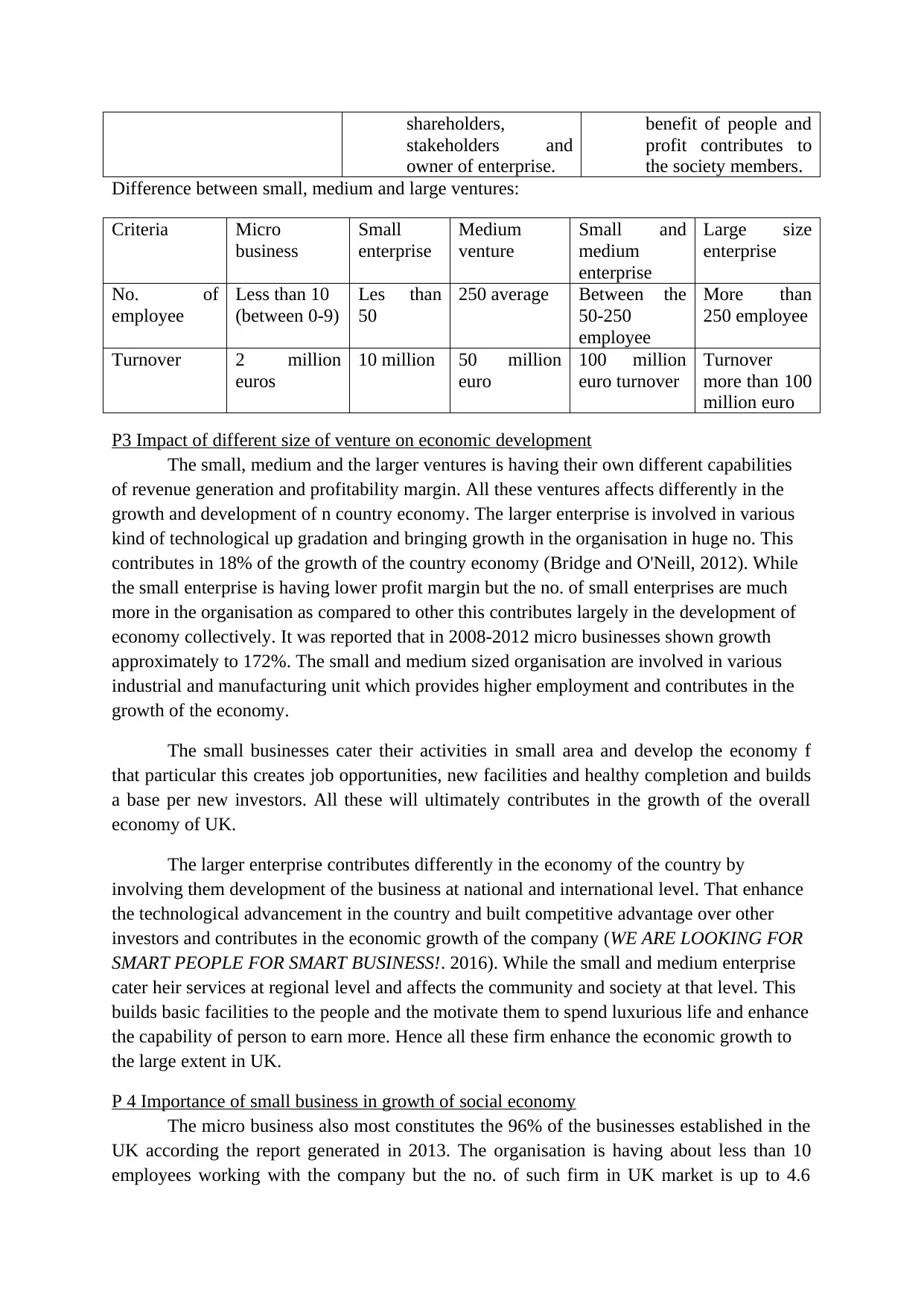
shareholders,
stakeholders and
owner of enterprise.
benefit of people and
profit contributes to
the society members.
Difference between small, medium and large ventures:
Criteria Micro
business
Small
enterprise
Medium
venture
Small and
medium
enterprise
Large size
enterprise
No. of
employee
Less than 10
(between 0-9)
Les than
50
250 average Between the
50-250
employee
More than
250 employee
Turnover 2 million
euros
10 million 50 million
euro
100 million
euro turnover
Turnover
more than 100
million euro
P3 Impact of different size of venture on economic development
The small, medium and the larger ventures is having their own different capabilities
of revenue generation and profitability margin. All these ventures affects differently in the
growth and development of n country economy. The larger enterprise is involved in various
kind of technological up gradation and bringing growth in the organisation in huge no. This
contributes in 18% of the growth of the country economy (Bridge and O'Neill, 2012). While
the small enterprise is having lower profit margin but the no. of small enterprises are much
more in the organisation as compared to other this contributes largely in the development of
economy collectively. It was reported that in 2008-2012 micro businesses shown growth
approximately to 172%. The small and medium sized organisation are involved in various
industrial and manufacturing unit which provides higher employment and contributes in the
growth of the economy.
The small businesses cater their activities in small area and develop the economy f
that particular this creates job opportunities, new facilities and healthy completion and builds
a base per new investors. All these will ultimately contributes in the growth of the overall
economy of UK.
The larger enterprise contributes differently in the economy of the country by
involving them development of the business at national and international level. That enhance
the technological advancement in the country and built competitive advantage over other
investors and contributes in the economic growth of the company (WE ARE LOOKING FOR
SMART PEOPLE FOR SMART BUSINESS!. 2016). While the small and medium enterprise
cater heir services at regional level and affects the community and society at that level. This
builds basic facilities to the people and the motivate them to spend luxurious life and enhance
the capability of person to earn more. Hence all these firm enhance the economic growth to
the large extent in UK.
P 4 Importance of small business in growth of social economy
The micro business also most constitutes the 96% of the businesses established in the
UK according the report generated in 2013. The organisation is having about less than 10
employees working with the company but the no. of such firm in UK market is up to 4.6
stakeholders and
owner of enterprise.
benefit of people and
profit contributes to
the society members.
Difference between small, medium and large ventures:
Criteria Micro
business
Small
enterprise
Medium
venture
Small and
medium
enterprise
Large size
enterprise
No. of
employee
Less than 10
(between 0-9)
Les than
50
250 average Between the
50-250
employee
More than
250 employee
Turnover 2 million
euros
10 million 50 million
euro
100 million
euro turnover
Turnover
more than 100
million euro
P3 Impact of different size of venture on economic development
The small, medium and the larger ventures is having their own different capabilities
of revenue generation and profitability margin. All these ventures affects differently in the
growth and development of n country economy. The larger enterprise is involved in various
kind of technological up gradation and bringing growth in the organisation in huge no. This
contributes in 18% of the growth of the country economy (Bridge and O'Neill, 2012). While
the small enterprise is having lower profit margin but the no. of small enterprises are much
more in the organisation as compared to other this contributes largely in the development of
economy collectively. It was reported that in 2008-2012 micro businesses shown growth
approximately to 172%. The small and medium sized organisation are involved in various
industrial and manufacturing unit which provides higher employment and contributes in the
growth of the economy.
The small businesses cater their activities in small area and develop the economy f
that particular this creates job opportunities, new facilities and healthy completion and builds
a base per new investors. All these will ultimately contributes in the growth of the overall
economy of UK.
The larger enterprise contributes differently in the economy of the country by
involving them development of the business at national and international level. That enhance
the technological advancement in the country and built competitive advantage over other
investors and contributes in the economic growth of the company (WE ARE LOOKING FOR
SMART PEOPLE FOR SMART BUSINESS!. 2016). While the small and medium enterprise
cater heir services at regional level and affects the community and society at that level. This
builds basic facilities to the people and the motivate them to spend luxurious life and enhance
the capability of person to earn more. Hence all these firm enhance the economic growth to
the large extent in UK.
P 4 Importance of small business in growth of social economy
The micro business also most constitutes the 96% of the businesses established in the
UK according the report generated in 2013. The organisation is having about less than 10
employees working with the company but the no. of such firm in UK market is up to 4.6
⊘ This is a preview!⊘
Do you want full access?
Subscribe today to unlock all pages.

Trusted by 1+ million students worldwide
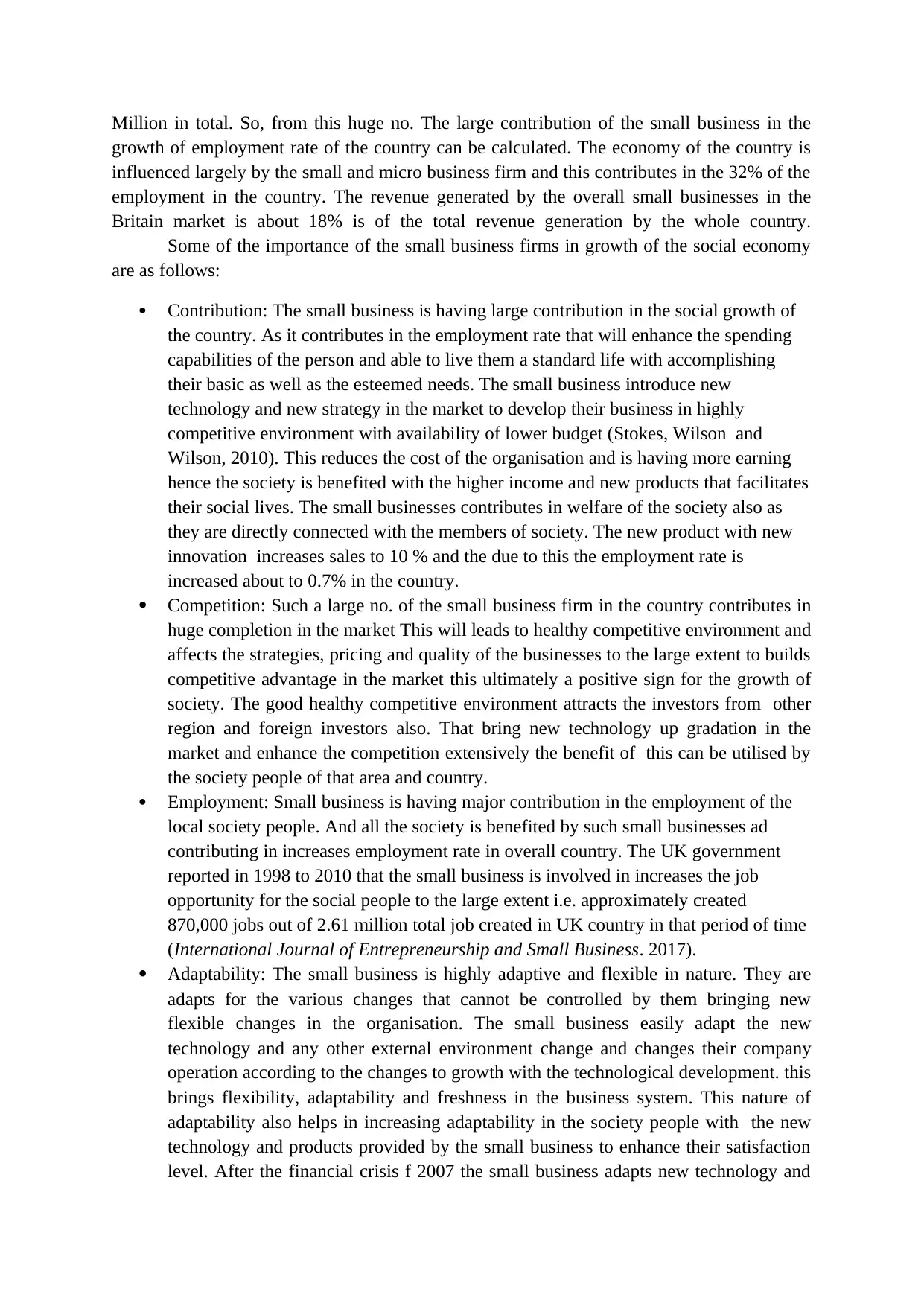
Million in total. So, from this huge no. The large contribution of the small business in the
growth of employment rate of the country can be calculated. The economy of the country is
influenced largely by the small and micro business firm and this contributes in the 32% of the
employment in the country. The revenue generated by the overall small businesses in the
Britain market is about 18% is of the total revenue generation by the whole country.
Some of the importance of the small business firms in growth of the social economy
are as follows:
Contribution: The small business is having large contribution in the social growth of
the country. As it contributes in the employment rate that will enhance the spending
capabilities of the person and able to live them a standard life with accomplishing
their basic as well as the esteemed needs. The small business introduce new
technology and new strategy in the market to develop their business in highly
competitive environment with availability of lower budget (Stokes, Wilson and
Wilson, 2010). This reduces the cost of the organisation and is having more earning
hence the society is benefited with the higher income and new products that facilitates
their social lives. The small businesses contributes in welfare of the society also as
they are directly connected with the members of society. The new product with new
innovation increases sales to 10 % and the due to this the employment rate is
increased about to 0.7% in the country.
Competition: Such a large no. of the small business firm in the country contributes in
huge completion in the market This will leads to healthy competitive environment and
affects the strategies, pricing and quality of the businesses to the large extent to builds
competitive advantage in the market this ultimately a positive sign for the growth of
society. The good healthy competitive environment attracts the investors from other
region and foreign investors also. That bring new technology up gradation in the
market and enhance the competition extensively the benefit of this can be utilised by
the society people of that area and country.
Employment: Small business is having major contribution in the employment of the
local society people. And all the society is benefited by such small businesses ad
contributing in increases employment rate in overall country. The UK government
reported in 1998 to 2010 that the small business is involved in increases the job
opportunity for the social people to the large extent i.e. approximately created
870,000 jobs out of 2.61 million total job created in UK country in that period of time
(International Journal of Entrepreneurship and Small Business. 2017).
Adaptability: The small business is highly adaptive and flexible in nature. They are
adapts for the various changes that cannot be controlled by them bringing new
flexible changes in the organisation. The small business easily adapt the new
technology and any other external environment change and changes their company
operation according to the changes to growth with the technological development. this
brings flexibility, adaptability and freshness in the business system. This nature of
adaptability also helps in increasing adaptability in the society people with the new
technology and products provided by the small business to enhance their satisfaction
level. After the financial crisis f 2007 the small business adapts new technology and
growth of employment rate of the country can be calculated. The economy of the country is
influenced largely by the small and micro business firm and this contributes in the 32% of the
employment in the country. The revenue generated by the overall small businesses in the
Britain market is about 18% is of the total revenue generation by the whole country.
Some of the importance of the small business firms in growth of the social economy
are as follows:
Contribution: The small business is having large contribution in the social growth of
the country. As it contributes in the employment rate that will enhance the spending
capabilities of the person and able to live them a standard life with accomplishing
their basic as well as the esteemed needs. The small business introduce new
technology and new strategy in the market to develop their business in highly
competitive environment with availability of lower budget (Stokes, Wilson and
Wilson, 2010). This reduces the cost of the organisation and is having more earning
hence the society is benefited with the higher income and new products that facilitates
their social lives. The small businesses contributes in welfare of the society also as
they are directly connected with the members of society. The new product with new
innovation increases sales to 10 % and the due to this the employment rate is
increased about to 0.7% in the country.
Competition: Such a large no. of the small business firm in the country contributes in
huge completion in the market This will leads to healthy competitive environment and
affects the strategies, pricing and quality of the businesses to the large extent to builds
competitive advantage in the market this ultimately a positive sign for the growth of
society. The good healthy competitive environment attracts the investors from other
region and foreign investors also. That bring new technology up gradation in the
market and enhance the competition extensively the benefit of this can be utilised by
the society people of that area and country.
Employment: Small business is having major contribution in the employment of the
local society people. And all the society is benefited by such small businesses ad
contributing in increases employment rate in overall country. The UK government
reported in 1998 to 2010 that the small business is involved in increases the job
opportunity for the social people to the large extent i.e. approximately created
870,000 jobs out of 2.61 million total job created in UK country in that period of time
(International Journal of Entrepreneurship and Small Business. 2017).
Adaptability: The small business is highly adaptive and flexible in nature. They are
adapts for the various changes that cannot be controlled by them bringing new
flexible changes in the organisation. The small business easily adapt the new
technology and any other external environment change and changes their company
operation according to the changes to growth with the technological development. this
brings flexibility, adaptability and freshness in the business system. This nature of
adaptability also helps in increasing adaptability in the society people with the new
technology and products provided by the small business to enhance their satisfaction
level. After the financial crisis f 2007 the small business adapts new technology and
Paraphrase This Document
Need a fresh take? Get an instant paraphrase of this document with our AI Paraphraser
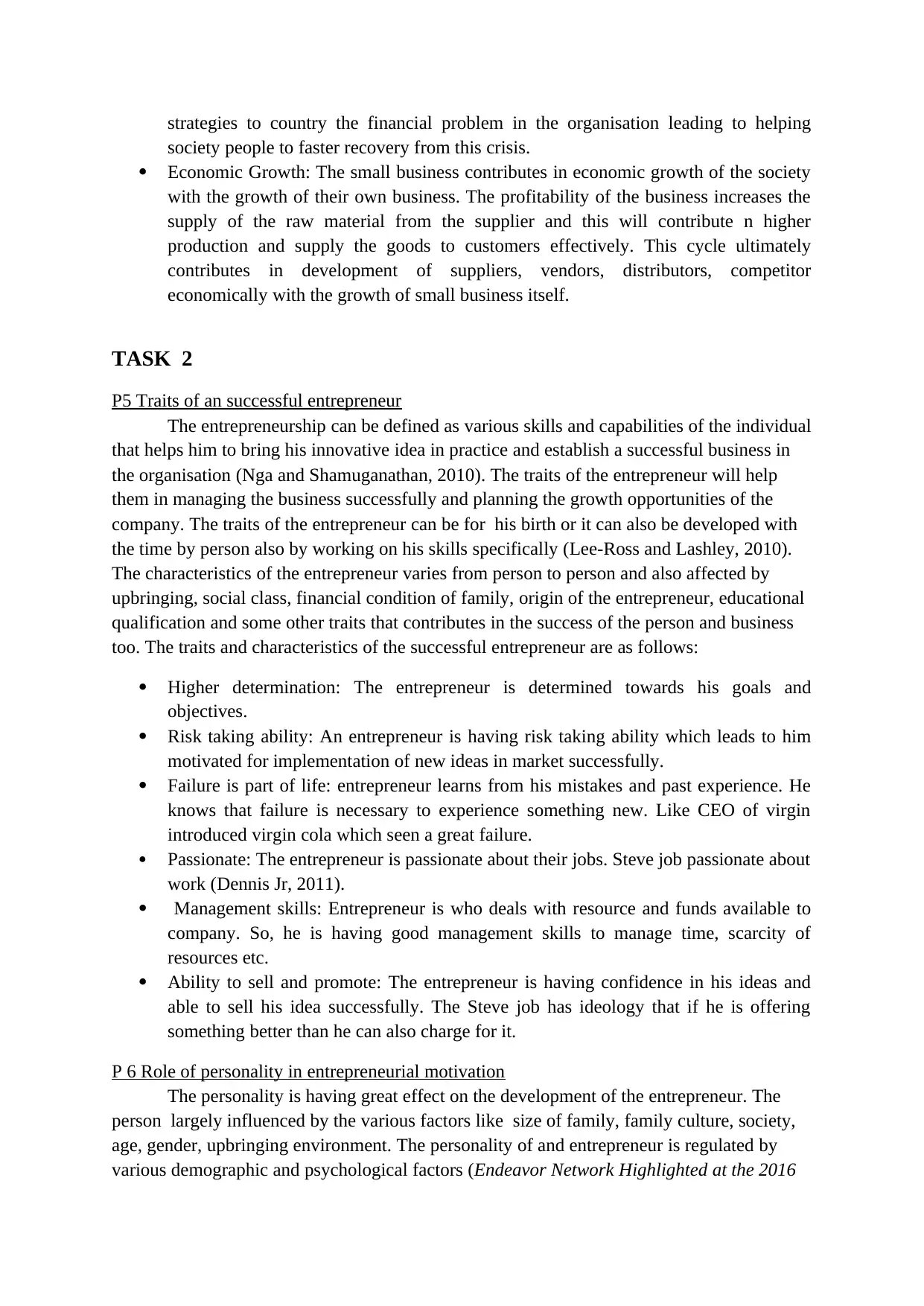
strategies to country the financial problem in the organisation leading to helping
society people to faster recovery from this crisis.
Economic Growth: The small business contributes in economic growth of the society
with the growth of their own business. The profitability of the business increases the
supply of the raw material from the supplier and this will contribute n higher
production and supply the goods to customers effectively. This cycle ultimately
contributes in development of suppliers, vendors, distributors, competitor
economically with the growth of small business itself.
TASK 2
P5 Traits of an successful entrepreneur
The entrepreneurship can be defined as various skills and capabilities of the individual
that helps him to bring his innovative idea in practice and establish a successful business in
the organisation (Nga and Shamuganathan, 2010). The traits of the entrepreneur will help
them in managing the business successfully and planning the growth opportunities of the
company. The traits of the entrepreneur can be for his birth or it can also be developed with
the time by person also by working on his skills specifically (Lee-Ross and Lashley, 2010).
The characteristics of the entrepreneur varies from person to person and also affected by
upbringing, social class, financial condition of family, origin of the entrepreneur, educational
qualification and some other traits that contributes in the success of the person and business
too. The traits and characteristics of the successful entrepreneur are as follows:
Higher determination: The entrepreneur is determined towards his goals and
objectives.
Risk taking ability: An entrepreneur is having risk taking ability which leads to him
motivated for implementation of new ideas in market successfully.
Failure is part of life: entrepreneur learns from his mistakes and past experience. He
knows that failure is necessary to experience something new. Like CEO of virgin
introduced virgin cola which seen a great failure.
Passionate: The entrepreneur is passionate about their jobs. Steve job passionate about
work (Dennis Jr, 2011).
Management skills: Entrepreneur is who deals with resource and funds available to
company. So, he is having good management skills to manage time, scarcity of
resources etc.
Ability to sell and promote: The entrepreneur is having confidence in his ideas and
able to sell his idea successfully. The Steve job has ideology that if he is offering
something better than he can also charge for it.
P 6 Role of personality in entrepreneurial motivation
The personality is having great effect on the development of the entrepreneur. The
person largely influenced by the various factors like size of family, family culture, society,
age, gender, upbringing environment. The personality of and entrepreneur is regulated by
various demographic and psychological factors (Endeavor Network Highlighted at the 2016
society people to faster recovery from this crisis.
Economic Growth: The small business contributes in economic growth of the society
with the growth of their own business. The profitability of the business increases the
supply of the raw material from the supplier and this will contribute n higher
production and supply the goods to customers effectively. This cycle ultimately
contributes in development of suppliers, vendors, distributors, competitor
economically with the growth of small business itself.
TASK 2
P5 Traits of an successful entrepreneur
The entrepreneurship can be defined as various skills and capabilities of the individual
that helps him to bring his innovative idea in practice and establish a successful business in
the organisation (Nga and Shamuganathan, 2010). The traits of the entrepreneur will help
them in managing the business successfully and planning the growth opportunities of the
company. The traits of the entrepreneur can be for his birth or it can also be developed with
the time by person also by working on his skills specifically (Lee-Ross and Lashley, 2010).
The characteristics of the entrepreneur varies from person to person and also affected by
upbringing, social class, financial condition of family, origin of the entrepreneur, educational
qualification and some other traits that contributes in the success of the person and business
too. The traits and characteristics of the successful entrepreneur are as follows:
Higher determination: The entrepreneur is determined towards his goals and
objectives.
Risk taking ability: An entrepreneur is having risk taking ability which leads to him
motivated for implementation of new ideas in market successfully.
Failure is part of life: entrepreneur learns from his mistakes and past experience. He
knows that failure is necessary to experience something new. Like CEO of virgin
introduced virgin cola which seen a great failure.
Passionate: The entrepreneur is passionate about their jobs. Steve job passionate about
work (Dennis Jr, 2011).
Management skills: Entrepreneur is who deals with resource and funds available to
company. So, he is having good management skills to manage time, scarcity of
resources etc.
Ability to sell and promote: The entrepreneur is having confidence in his ideas and
able to sell his idea successfully. The Steve job has ideology that if he is offering
something better than he can also charge for it.
P 6 Role of personality in entrepreneurial motivation
The personality is having great effect on the development of the entrepreneur. The
person largely influenced by the various factors like size of family, family culture, society,
age, gender, upbringing environment. The personality of and entrepreneur is regulated by
various demographic and psychological factors (Endeavor Network Highlighted at the 2016
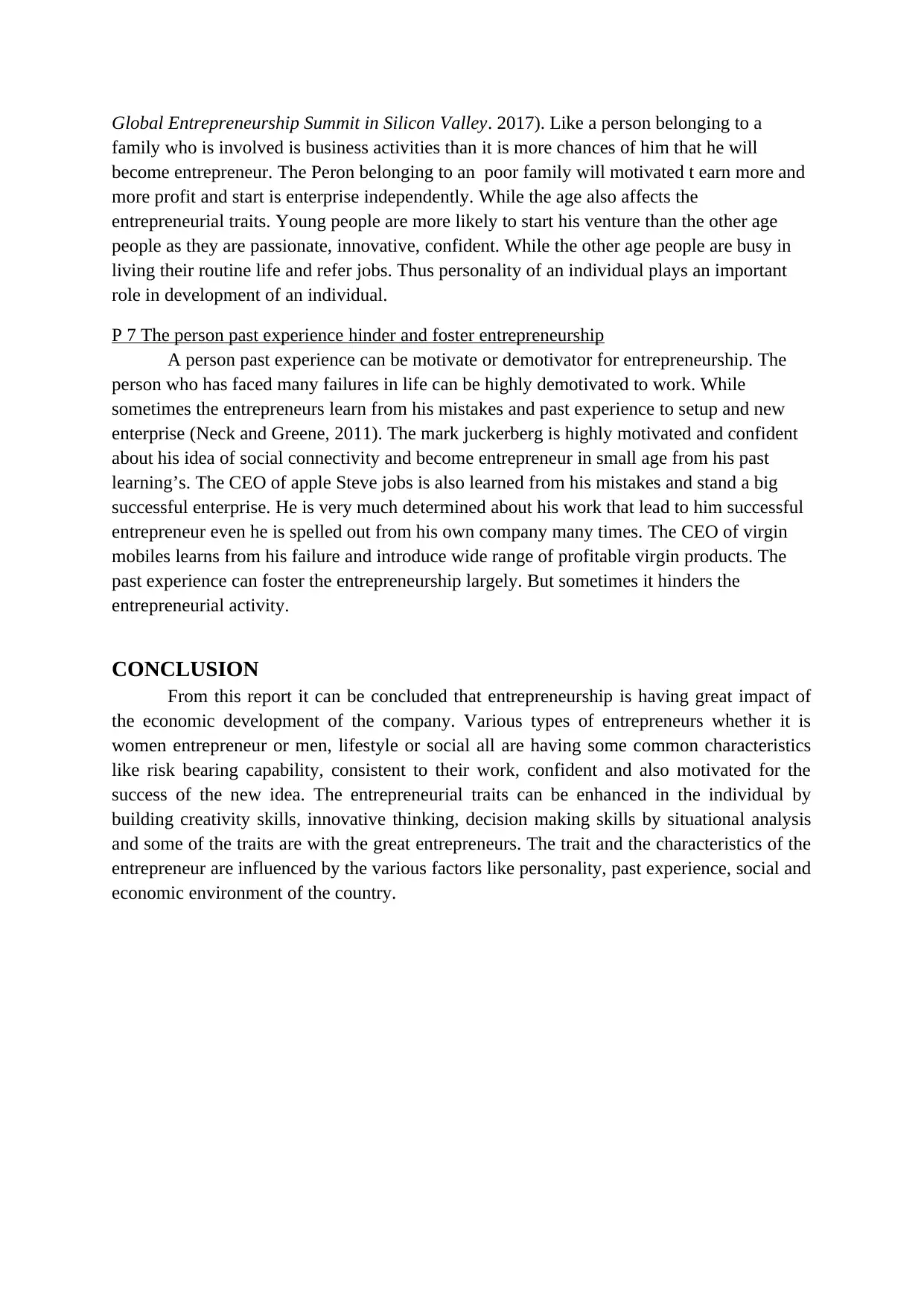
Global Entrepreneurship Summit in Silicon Valley. 2017). Like a person belonging to a
family who is involved is business activities than it is more chances of him that he will
become entrepreneur. The Peron belonging to an poor family will motivated t earn more and
more profit and start is enterprise independently. While the age also affects the
entrepreneurial traits. Young people are more likely to start his venture than the other age
people as they are passionate, innovative, confident. While the other age people are busy in
living their routine life and refer jobs. Thus personality of an individual plays an important
role in development of an individual.
P 7 The person past experience hinder and foster entrepreneurship
A person past experience can be motivate or demotivator for entrepreneurship. The
person who has faced many failures in life can be highly demotivated to work. While
sometimes the entrepreneurs learn from his mistakes and past experience to setup and new
enterprise (Neck and Greene, 2011). The mark juckerberg is highly motivated and confident
about his idea of social connectivity and become entrepreneur in small age from his past
learning’s. The CEO of apple Steve jobs is also learned from his mistakes and stand a big
successful enterprise. He is very much determined about his work that lead to him successful
entrepreneur even he is spelled out from his own company many times. The CEO of virgin
mobiles learns from his failure and introduce wide range of profitable virgin products. The
past experience can foster the entrepreneurship largely. But sometimes it hinders the
entrepreneurial activity.
CONCLUSION
From this report it can be concluded that entrepreneurship is having great impact of
the economic development of the company. Various types of entrepreneurs whether it is
women entrepreneur or men, lifestyle or social all are having some common characteristics
like risk bearing capability, consistent to their work, confident and also motivated for the
success of the new idea. The entrepreneurial traits can be enhanced in the individual by
building creativity skills, innovative thinking, decision making skills by situational analysis
and some of the traits are with the great entrepreneurs. The trait and the characteristics of the
entrepreneur are influenced by the various factors like personality, past experience, social and
economic environment of the country.
family who is involved is business activities than it is more chances of him that he will
become entrepreneur. The Peron belonging to an poor family will motivated t earn more and
more profit and start is enterprise independently. While the age also affects the
entrepreneurial traits. Young people are more likely to start his venture than the other age
people as they are passionate, innovative, confident. While the other age people are busy in
living their routine life and refer jobs. Thus personality of an individual plays an important
role in development of an individual.
P 7 The person past experience hinder and foster entrepreneurship
A person past experience can be motivate or demotivator for entrepreneurship. The
person who has faced many failures in life can be highly demotivated to work. While
sometimes the entrepreneurs learn from his mistakes and past experience to setup and new
enterprise (Neck and Greene, 2011). The mark juckerberg is highly motivated and confident
about his idea of social connectivity and become entrepreneur in small age from his past
learning’s. The CEO of apple Steve jobs is also learned from his mistakes and stand a big
successful enterprise. He is very much determined about his work that lead to him successful
entrepreneur even he is spelled out from his own company many times. The CEO of virgin
mobiles learns from his failure and introduce wide range of profitable virgin products. The
past experience can foster the entrepreneurship largely. But sometimes it hinders the
entrepreneurial activity.
CONCLUSION
From this report it can be concluded that entrepreneurship is having great impact of
the economic development of the company. Various types of entrepreneurs whether it is
women entrepreneur or men, lifestyle or social all are having some common characteristics
like risk bearing capability, consistent to their work, confident and also motivated for the
success of the new idea. The entrepreneurial traits can be enhanced in the individual by
building creativity skills, innovative thinking, decision making skills by situational analysis
and some of the traits are with the great entrepreneurs. The trait and the characteristics of the
entrepreneur are influenced by the various factors like personality, past experience, social and
economic environment of the country.
⊘ This is a preview!⊘
Do you want full access?
Subscribe today to unlock all pages.

Trusted by 1+ million students worldwide
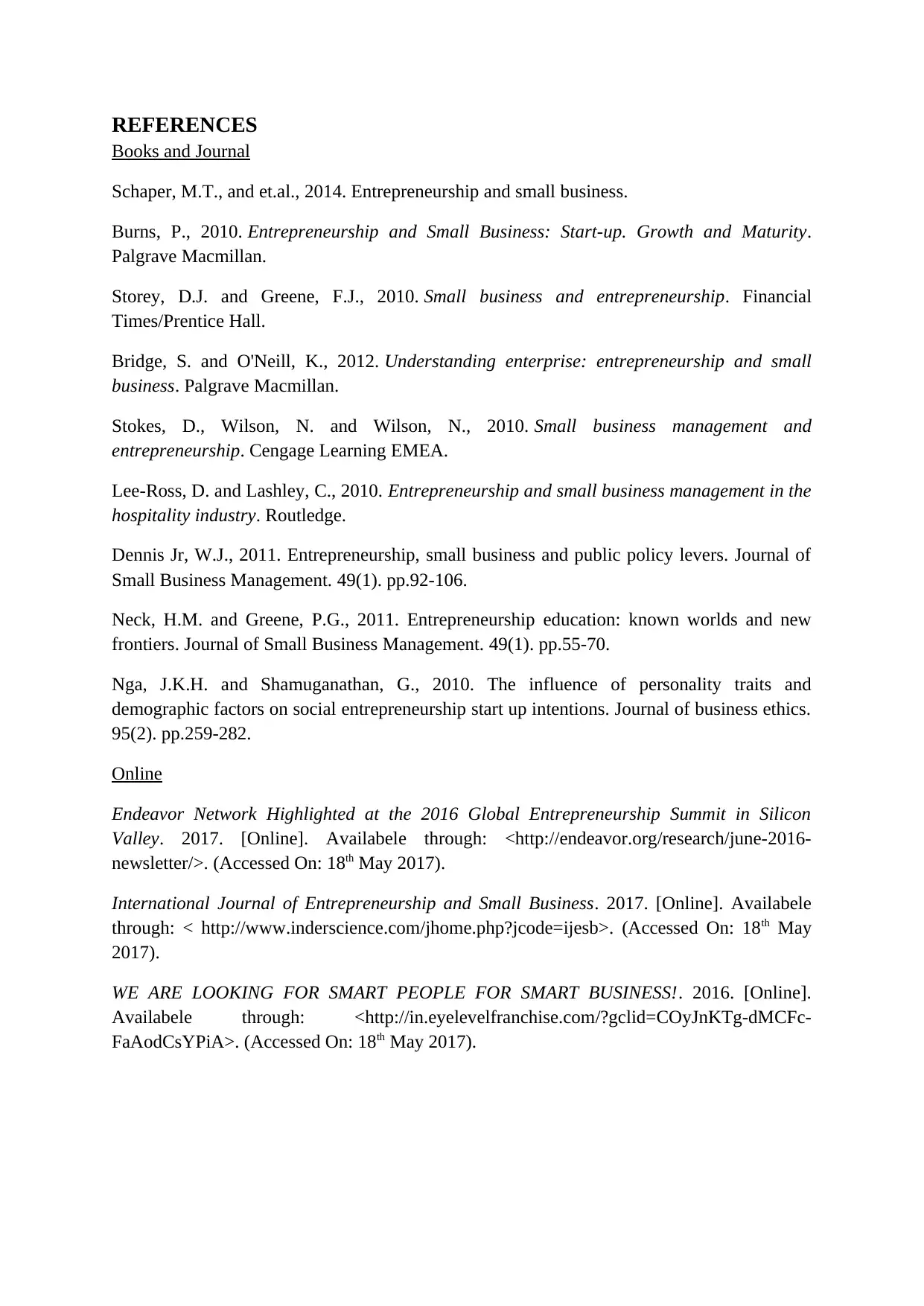
REFERENCES
Books and Journal
Schaper, M.T., and et.al., 2014. Entrepreneurship and small business.
Burns, P., 2010. Entrepreneurship and Small Business: Start-up. Growth and Maturity.
Palgrave Macmillan.
Storey, D.J. and Greene, F.J., 2010. Small business and entrepreneurship. Financial
Times/Prentice Hall.
Bridge, S. and O'Neill, K., 2012. Understanding enterprise: entrepreneurship and small
business. Palgrave Macmillan.
Stokes, D., Wilson, N. and Wilson, N., 2010. Small business management and
entrepreneurship. Cengage Learning EMEA.
Lee-Ross, D. and Lashley, C., 2010. Entrepreneurship and small business management in the
hospitality industry. Routledge.
Dennis Jr, W.J., 2011. Entrepreneurship, small business and public policy levers. Journal of
Small Business Management. 49(1). pp.92-106.
Neck, H.M. and Greene, P.G., 2011. Entrepreneurship education: known worlds and new
frontiers. Journal of Small Business Management. 49(1). pp.55-70.
Nga, J.K.H. and Shamuganathan, G., 2010. The influence of personality traits and
demographic factors on social entrepreneurship start up intentions. Journal of business ethics.
95(2). pp.259-282.
Online
Endeavor Network Highlighted at the 2016 Global Entrepreneurship Summit in Silicon
Valley. 2017. [Online]. Availabele through: <http://endeavor.org/research/june-2016-
newsletter/>. (Accessed On: 18th May 2017).
International Journal of Entrepreneurship and Small Business. 2017. [Online]. Availabele
through: < http://www.inderscience.com/jhome.php?jcode=ijesb>. (Accessed On: 18th May
2017).
WE ARE LOOKING FOR SMART PEOPLE FOR SMART BUSINESS!. 2016. [Online].
Availabele through: <http://in.eyelevelfranchise.com/?gclid=COyJnKTg-dMCFc-
FaAodCsYPiA>. (Accessed On: 18th May 2017).
Books and Journal
Schaper, M.T., and et.al., 2014. Entrepreneurship and small business.
Burns, P., 2010. Entrepreneurship and Small Business: Start-up. Growth and Maturity.
Palgrave Macmillan.
Storey, D.J. and Greene, F.J., 2010. Small business and entrepreneurship. Financial
Times/Prentice Hall.
Bridge, S. and O'Neill, K., 2012. Understanding enterprise: entrepreneurship and small
business. Palgrave Macmillan.
Stokes, D., Wilson, N. and Wilson, N., 2010. Small business management and
entrepreneurship. Cengage Learning EMEA.
Lee-Ross, D. and Lashley, C., 2010. Entrepreneurship and small business management in the
hospitality industry. Routledge.
Dennis Jr, W.J., 2011. Entrepreneurship, small business and public policy levers. Journal of
Small Business Management. 49(1). pp.92-106.
Neck, H.M. and Greene, P.G., 2011. Entrepreneurship education: known worlds and new
frontiers. Journal of Small Business Management. 49(1). pp.55-70.
Nga, J.K.H. and Shamuganathan, G., 2010. The influence of personality traits and
demographic factors on social entrepreneurship start up intentions. Journal of business ethics.
95(2). pp.259-282.
Online
Endeavor Network Highlighted at the 2016 Global Entrepreneurship Summit in Silicon
Valley. 2017. [Online]. Availabele through: <http://endeavor.org/research/june-2016-
newsletter/>. (Accessed On: 18th May 2017).
International Journal of Entrepreneurship and Small Business. 2017. [Online]. Availabele
through: < http://www.inderscience.com/jhome.php?jcode=ijesb>. (Accessed On: 18th May
2017).
WE ARE LOOKING FOR SMART PEOPLE FOR SMART BUSINESS!. 2016. [Online].
Availabele through: <http://in.eyelevelfranchise.com/?gclid=COyJnKTg-dMCFc-
FaAodCsYPiA>. (Accessed On: 18th May 2017).
Paraphrase This Document
Need a fresh take? Get an instant paraphrase of this document with our AI Paraphraser

1 out of 11
Related Documents
Your All-in-One AI-Powered Toolkit for Academic Success.
+13062052269
info@desklib.com
Available 24*7 on WhatsApp / Email
![[object Object]](/_next/static/media/star-bottom.7253800d.svg)
Unlock your academic potential
Copyright © 2020–2025 A2Z Services. All Rights Reserved. Developed and managed by ZUCOL.




